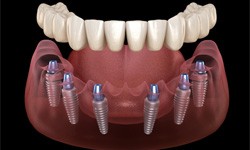Dental Implants – Dallas, TX
Replace Your Missing Teeth for Good
Losing just one tooth can have dramatic repercussions for your oral health. You can fill in the gap with a traditional restoration such as a bridge, but what if you want a more permanent solution that’s almost as good as getting your original tooth back? Dental implants are a revolutionary replacement option that brings back the missing tooth roots along with the part used for chewing and smiling. Set up a consultation to discuss dental implants in Dallas, TX with Dr. Tunnell today to learn more.

Why Choose Central Perio for Dental Implants?
- Highly Trained, Experienced Periodontist
- State of the Art Periodontal Technology
- Personalized Attention for Each Patient
What are Dental Implants?

By itself, a dental implant is just a thin metal post; you wouldn’t be able to tell that it’s used to replace teeth just by looking at it. Its function is to act as a “root” for a prosthetic tooth or teeth. It’s made out of titanium or another material that can fuse with the bone through a process called osseointegration. Placing crowns, bridges, or dentures on implants gives them a strength and stability that they wouldn’t have on their own.
The 4 Step Dental Implant Process

In recent years, dental implants have become the treatment of choice for patients with missing teeth. Unlike traditional methods, they require a multi-step process that spans several months. The good news is that our team is able to complete the entire dental implant process from start to finish right here in our office. You don’t have to worry about visiting an outside specialist because we’ll be there for you every step of the way! Even though every patient’s treatment plan will look slightly different, there are four main steps you can expect – let’s take a closer look at what they are.
Initial Dental Implant Consultation

The first step on your journey towards a complete, fully functioning smile is a consultation with Dr. Tunnell. He’ll conduct a thorough oral examination, review your medical history, and inquire about your goals to determine whether or not dental implants are the right choice for you. Depending on the current state of your oral health, you may need certain preliminary procedures like gum disease therapy, bone grafting, or even extractions. We won’t move forward until we’ve made sure that your mouth and jawbone are healthy enough for implants. After making any necessary preparations, we’ll move on to the second step, which is the surgery to place the implants.
Dental Implant Surgery

Since Dr. Tunnell is a highly trained and experienced periodontist, he can perform every step of the dental implant process, including oral surgery. Before the procedure begins, he’ll numb your mouth to ensure you’re completely comfortable. Then, he’ll make small incisions in the gum tissue to access your jawbone. Once the implants are surgically inserted, he’ll suture your gums shut and place a protective cap over the posts to protect them throughout the healing process.
Dental Implant Osseointegration & Abutment Placement

Following dental implant surgery, you’ll spend about three to six months waiting for the implants to fuse with the surrounding bone tissue via a natural process called osseointegration. That’s what makes your new smile so reliable. Since they’ll stay firmly rooted in place, you don’t have to worry about your teeth moving while in use.
Once you’re all healed up, you’ll return to our office for a second minor surgery to receive your abutments. The small metal connector pieces are placed on top of your implants, allowing us to secure your personalized restoration into place.
Delivery of Dental Implant Restorations

After the abutment is in place and your mouth has fully recovered, you’ll be ready to receive the final restoration during the fourth and last step. Your new dental crown, bridge, or denture will be designed based on the impressions of your natural smile. When in place, they’ll blend seamlessly with your remaining teeth. Once we make sure your bite is comfortable, you’ll be ready to enjoy your new grin that same day!
Restoring Your Dental Implant

“Restoring” a dental implant is what we call placing a crown, bridge, or denture onto the posts once osseointegration is complete. This step is typically handled by your regular dentist; they will take an impression of your mouth once the abutments are in place, have a separate dental lab make the restoration, then attach it to the implant. We’ll work alongside your dentist during the implant process and make sure that you know exactly what is going to happen during each step.
Benefits of Dental Implants

Ideally, our teeth would last forever. However, many people end up losing one or more of their teeth throughout their lifetime. This can be due to decay, injuries, gum disease, and other reasons. Fortunately, dental implants are available to restore both the root and crown of the teeth. Because of this, there are so many unique benefits you can expect. Read on to learn more about the advantages of choosing dental implants.
Day-to-Day Benefits

Dental implants feel just like natural teeth do, so you shouldn’t notice them much in your everyday life. Ultimately, you should be able to enjoy all the things you did before losing your teeth. Here are some of the benefits that you can experience from day to day:
- Restored Bite Force: Your bite force can be restored to 80% or higher. This is much more than you can experience with bridges or dentures.
- Easy to Maintain: You care for dental implants the same way you do for natural teeth. Brush, floss, and use mouthwash.
- Increased Confidence: You don’t need to worry about visible gaps in your smile or a poor-fitting restoration.
Health Benefits

In addition to the noticeable benefits that you will experience daily, your health will also be positively influenced by your smile’s new addition. Here’s what you can expect:
- Improved Dental Health: This means a lower risk of cavities, gum disease, infection, and additional tooth loss. None of your natural teeth will need to be altered for this restoration either.
- Better Overall Health: Having excellent dental health has a positive influence on your overall health. It even lowers your risk of serious medical problems, like diabetes and heart disease.
- Prevents Bone Loss: When you’re missing teeth, jawbone deterioration will follow. Dental implants stimulate the jawbone just like natural tooth roots to keep it strong.
Long-Term Benefits

When you choose dental implants, you are making a long-term investment in your smile. Here are some benefits that you can experience many years down the road:
- Implant Success: Dental implants are very successful with a success rate of over 95%. Your chances of experiencing an implant failure are very low.
- Permanent: Dental implants can last upwards of 30 years with proper maintenance.
- Save Money: You don’t need to worry about stocking up on adhesives or soaking solutions. There won’t be frequent repairs or replacements either. Dental implants also reduce your risk of many health issues, meaning that you won’t need to endure costly treatments that will add up over time.
Who Dental Implants Can Help

One of the biggest advantages of dental implants is the fact that they can be used in many different situations. Whether you’re only missing one tooth or need to replace an entire arch, dental implants can still be a viable choice! During your initial consultation, we’ll examine your mouth, determine if implants are right for your smile, and put together a personalized treatment plan based on our findings.
Who Is a Good Candidate for Dental Implants?

To get dental implants, you need to meet three main criteria:
- First, you need to have good health overall. Dental implant placement involves minor surgery, so it’s important to make sure that your body will be able to heal successfully after the treatment.
- Second, you need to not have gum disease, cavities, or other oral health issues, as they could affect the success of your implants. Gum disease in particular is a leading cause of implant failure and needs to be addressed beforehand.
- Third, you need a jawbone that’s strong enough to support the implant posts. If we find that there’s not enough bone in your jaw, don’t worry; you may still be able to get implants after a bone grafting treatment.
Missing One Tooth

A single dental implant can act as the base for a dental crown to replace a single missing tooth. Unlike traditional dental bridges, an implant crown doesn’t involve making any alterations to your natural teeth, making it a good option if you want to preserve as much of your natural smile as possible. The crown will be made out of tooth-colored materials so that it can blend in with the rest of your grin. Some patients even occasionally forget which tooth was the one that got replaced!
Missing Multiple Teeth

When multiple teeth are missing, you don’t need to get a separate implant to replace each one of them. If three or more consecutive teeth were lost, they can be replaced with two dental implant posts and a bridge. The crowns at either end of the bridge will be attached to the implants so that the false teeth between them can fill the rest of the gap.
Patients who need to replace teeth in multiple parts of the mouth may be able to get a partial denture supported by dental implants. The number of implant posts needed for a partial denture can vary based on the situation.
Missing All Teeth

It only takes 4 to 6 implant posts to support a full denture and replace all of the teeth in a single arch. Dentures that are attached to implants are much more stable than traditional dentures that rest on the gums. You won’t have to worry about implant dentures slipping, and you’ll be able to eat all of your favorite foods without any issues. Most of the time implant dentures are fixed in place, but they can also be made removable based on your needs and preferences.
Importance of Bone & Bone Grafting

Without a sufficient amount of bone density in your jaw, you can’t get dental implants. The jaw needs to be able to join with and support the implant posts, and that can only be done if there’s a sufficient amount of bone tissue present. Missing teeth can lead to a decrease in jawbone density, so before placing implants, we may need to perform a bone graft first. This procedure adds new tissue to the area and encourages the body to start forming new bone as needed.
Maintaining & Caring for Your Dental Implants

These days, dental implants are considered the gold standard of tooth replacement. Since they have the potential to keep your smile strong and healthy for a lifetime, it’s easy to see why they’re the preferred method. However, their longevity heavily depends on how well you take care of your newly rebuilt grin. You need to protect your implants from damage and infection to lower the chances of failure. By following a few simple precautions and healthy habits, you can expect to enjoy your results for life!
Make Oral Hygiene a Priority

Your oral hygiene routine won’t change very much once you get dental implants. You can brush and floss your new teeth the same way you would your natural ones. Make sure that you aren’t using abrasive toothpaste that could damage the surface of your implant restorations. Taking proper care of your smile will lower your risk of oral health issues (like gum disease and tooth decay) that can cause your implant to fail.
Eat a Healthy Diet

Once you’re all healed up, you can eat almost anything you want with your new smile! Of course, you should still be mindful of your diet. Overindulging in sugary, sticky, and hard foods can be detrimental to your implants. Instead, you should eat nutrient-rich foods that contain lots of calcium and vitamin C. These foods will keep your jawbone strong and gum tissues healthy!
Break Bad Habits

Do you smoke? Bite your fingernails? Chew on pens or pencils? Use your teeth as tools? While these habits may seem harmless, they can damage your implants. If you fail to kick these habits to the curb, you may end up right back where you started – with missing teeth. Breaking these habits will allow you to enjoy a strong and complete smile for years to come!
Protect Your Dental Implants

Although dental implants are extremely durable, they’re not indestructible. If you regularly play sports, you should ask about a custom-made mouthguard to protect your teeth should you sustain a blow to the face. If you grind your teeth at night, you can wear a nightguard to prevent unnecessary wear and tear.
Schedule Regular Dental Checkups

Everyone needs to visit their dentist every six months for a checkup and cleaning. These routine appointments are especially important if you have dental implants, as your dentist will ensure there are no problems developing with your smile. They’ll carefully review your prosthetics and customized restorations each time. With early intervention, they can address issues before they turn into complications.
Dental Implant Post-Op Instructions

After getting dental implants, it's important to give your mouth time to heal – just like with any oral surgery. Our team at Central Perio is here to support you throughout the recovery journey. Right after the procedure, we'll give you specific instructions to help you recover quickly and without any hassle. Click on the button below for some general guidelines to give you an idea of what to expect during this time. Remember, if you have any questions or encounter any issues, don't hesitate to reach out to us. We're here to help!
What to Do Directly After Dental Implant Surgery

To ensure a successful dental implant placement, it's crucial to take good care of the blood clot that forms after your surgery. You should avoid touching or disturbing your gums as this allows them to heal properly around the metal post. That said, here are a few things you should steer clear of:
- Spitting (use tissues or swallow your saliva)
- Drinking from a straw
- Smoking or chewing tobacco
- Placing your tongue or fingers on or near the implant site
Common Side-Effects When Recovering from Dental Implant Placement

If you’ve never undergone oral surgery before, it can be difficult to understand which symptoms are normal and which ones are not. Although you may feel mild discomfort or soreness for the first few days following your treatment, you should give us a call if it persists or worsens. You will also likely experience some of these common side effects:
- Minor discomfort, which can be relieved with prescribed or over-the-counter pain reliever
- Swelling in the gums that lasts more than a week. This can be alleviated by placing a cold compress on the outside of the mouth
- Intermittent bleeding, which can be managed by applying gentle pressure with a gauze on the surgical site
Your Diet After Dental Implant Surgery

Following your procedure, you should stick to a soft-food diet to avoid interfering with the blood clot. Make sure you stock up on foods like:
- Pudding
- Cold soup
- Yogurt
- Ice cream
- Scrambled eggs
- Mashe potatoes
- Pasta
Post-Op Health & Oral Hygiene

Taking proper care of your smile is the best way to ensure your dental implants bond successfully with your jawbone. Plus, it’ll help you lower the chances of bacteria and infection wreaking havoc on your teeth. You should try practicing the following health tips:
- Brush your teeth like normal, except be careful and gentle when scrubbing near the implant site.
- Rinse with salt water at least 2-3 times a day, especially after eating. Don’t spit out your water! Instead, let it pour from your mouth into the sink.
- Avoid using mouthwash that contains alcohol, as it could lead to discomfort.
What to Do After Your New Teeth Are Attached

After you’ve recovered, and your implants have successfully fused with your jawbone, you will return to our office for the placement of your restoration! You might feel mild sensitivity in your gums, but you could easily manage it with pain medication. Should you notice bleeding or swelling after we attach your restoration, let us know right away. We’ll address any underlying issues as soon as possible so you can fully enjoy your restored smile!
Dental Implant Failure & Salvage

Dental implants are the best tooth replacement option out there. Since they replace the roots of the missing teeth, they offer numerous benefits that you don’t get with traditional tooth replacements. Once of these pros is their incredible success rate of over 95%! That being said, dental implant failure is still possible, so it’s important to be on the lookout for signs that something is wrong. The sooner we can address problems, the more likely that we can save your replacement teeth.
Learn More About Dental Implant Failure & Salvage
Dental Implant FAQs

Getting dental implants in Dallas is a lengthy process that requires oral surgery. Because of that, you may have several questions and concerns before committing to treatment. At Central Perio, we want you to be as well-informed as possible to ensure you feel confident with your decision to rebuild your smile. That’s why we’ve decided to answer some frequently asked questions below! Should you not find what you’re looking for, feel free to contact our office for personal assistance.
Does Getting Dental Implants Hurt?
While the dental implant process may sound daunting, it’s not as bad as you think! Before your procedure, your mouth will be numbed with a local anesthetic to ensure you’re completely comfortable. You may even receive dental sedation to lower your body’s ability to register pain. However, your mouth will likely feel sore for a few days following your surgery. The good news is you can easily manage your discomfort by taking over-the-counter pain medication and using cold compresses as needed.
Are Dental Implants Safe?
Absolutely! When placed by a qualified dental professional, dental implants have an impressive success rate of about 95%. If you have pre-existing issues like inadequate jawbone density or gum disease, you’ll need to undergo certain preliminary treatments to make dental implant surgery safer and more successful. It’s also worth noting that factors such as diabetes, cancer, or other medical conditions can make it risky for you to get dental implants in Dallas.
What Can Cause Dental Implants to Fail?
There are two main reasons why dental implant failure occurs: peri-implantitis and failed osseointegration. Peri-implantitis is a form of gum disease that can damage the bone and gums supporting the implant. Meanwhile, failed osseointegration is when the titanium post doesn’t successfully integrate with the jawbone. A few other causes of implant failure include chronic teeth grinding, tobacco use, and certain health conditions.
Can I Get Dental Implants If I’m Diabetic?
If your diabetes is under control, your chances of dental implant success are comparable to those of nondiabetic patients. Otherwise, chronic high blood sugar can negatively affect the healing process and make it harder for your implants to fuse with your jawbone. Diabetic patients who are interested in dental implants in Dallas should talk to their endocrinologist or primary care physician about getting their blood sugar levels under control before moving forward with treatment.
How Long Do Dental Implants Last?
Many patients want to know how long they can expect dental implants to last before committing to the procedure. These replacement teeth tend to be more resilient and last longer than alternatives like dental bridges and dentures. Most people enjoy their benefits for anywhere from 10 to 25+ years, though they’ve been known to last a lifetime depending on how well they’re maintained.
You can extend their lifespan by brushing and flossing twice daily, taking care not to press too far into the pockets of your gums, which can damage the implant seal. Also, don’t use your teeth as tools, and try to avoid overly hard foods that could chip, crack, or damage them.
Can I Take Dental Implants Out?
It’s natural to wonder whether these restorations function like dentures, which are intended to be easily removed and reinserted for cleanings. However, dental implants involve embedding a titanium rod directly into your jawbone.
Once placed, it takes weeks or months for your jaw to create enough new bone growth to fuse with the metal pole in a process called osseointegration. After this healing is complete, your prosthetic is considered a permanent part of your smile.
How Long Does It Take to Recover from Dental Implant Surgery?
If you’re worried that you’ll be out of commission for weeks for recovery, you can safely set your concerns aside. Most patients may need to take a day or two off of work to heal, but generally, you can resume relatively normal activities the day after your procedure.
However, you should still avoid any overly strenuous activities that elevate your blood pressure or heartrate because they can dislodge the blood clot that must form at the implant site for it to heal effectively. Oozing or bleeding generally stops after a couple of days, and associated aches and inflammation peak after the third day and then begin to subside.
Taking over-the-counter meds like Tylenol or ibuprofen is usually safe to address throbbing until it eases on its own.
Can I Get Dental Implants If I Smoke?
Although it’s possible for individuals to smoke cigarettes, vape, or chew tobacco after getting dental implants, it’s typically not recommended. Tobacco products contain nicotine, which is a vasoconstrictor. It hinders your blood oxygen levels and flow, so your body can’t deliver essential nutrients to your teeth and gums.
Furthermore, it suppresses your immune system, increasing your vulnerability to gum disease. If you’re not careful, bacteria in your mouth can penetrate the surgical site and cause an infection called peri-implantitis, which is the leading cause of failure.
